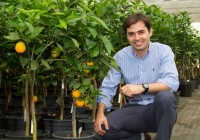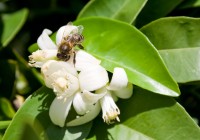25
ago
To keep the hives alive categories: Environment

A few weeks ago we published here the news about a project developed by Fundecitrus, a research organization that gathers citrus growers and the industry, for the good coexistence between the citrus industry and beekeeping. The management of bees is one of the main concerns of agriculture nowadays. In Brazil, it’s one aspect that has been moving several agricultural chains for preservation and good coexistence actions with these small insects. One of these initiatives is the project Colmeia Viva, which is, since 2013, promoted by the National Plant Protection Products Union, Sindiveg, an association consisted of 45 companies in the agrochemicals sector.
The initiative purpose is to encourage dialogue between growers and beekeepers so that together we can find ways to a relationship that values a rational environment, grove and bee protection, creating tools to keep a balanced dialogue, integrating Agriculture and Beekeeping. In order to do that, the project created a monitoring program called Interactive Bee Mapping (Mapeamento de Abelhas Participativo – MAP, in Portuguese). Created in partnership with Brazilian universities such as Unesp and UFScar, the tool promotes a data collection on bee mortality in a new mapping of contributing factors to the loss of hives and bees in the state of São Paulo, the main citrus producer region in Brazil.
The program works in an interactive way with farmers who contact the project whenever they find hives in their properties and they get registered. After that, professionals are sent to the farm to analyze the situation in the field. They observe the condition of the hives, the state of bees, the kind of groves on site. In case there are bees which can be analyzed, they are collected and sent to a lab certified by Inmetro, institute accredited by the Brazilian government responsible for certifying the quality of products and services. The team receives information from the lab to complete the analyzes and then gives to the farmer a real general and best practices recommendation kit, so he can know the right way to work without harming the bees. All this process takes around 60 days.
Besides, the project still promotes a series of workshops, gathering farmers, researchers and specialists to discuss best practices and spread the knowledge resulted from the bee mapping.
The idea is that the initiative results in a National Action Plan focused in best practices in applying agrochemicals for a more productive relationship between beekeeping and agriculture.
To see the project Colmeia Viva, in Portuguese, click here
http://projetocolmeiaviva.org.br/
- |

